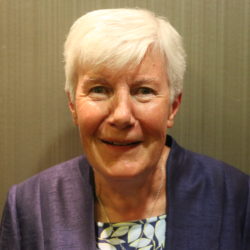Gort Mercy Convent and its Branch Houses by Mary de Lourdes Fahy rsm

The recently published book, Near Quiet Waters, The Story of the early years of Gort Mercy Convent and its Branch Houses, by Mary de Lourdes Fahy rsm, is an authoritative record of the refining influence of the Gort nuns in the past. At the same time, it illustrates ample cause for celebrating their ongoing achievements.
Coinciding, as it does, with the 150th anniversary of the arrival of the Sisters of Mercy in Gort, on 5th November, 1857, and without a scintilla of any motive save to set the story in context, this 146 page book simply outlines for, in particular, the people of South Galway, North Clare and Titusville, Florida, how much they have to be thankful to the nuns for. Their efforts on behalf of the local people are aptly suggested in the Foreword by Fr. Colm Cooke, who writes “the past pupils of Gort Convent are its monument and achievement”.
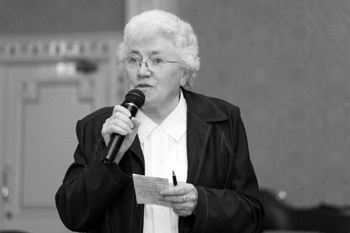 The Scribe, Mary de Lourdes Fahy rsm
The Scribe, Mary de Lourdes Fahy rsm
In her genial and assured manner, Mary de Lourdes Fahy takes the reader to meet the nuns. The nun’s veil does not intrude on their aura of understanding, generosity, tolerance, courage and sense of humour. Each character embodies the mission statement of providing holistic education in school and college or medical care in hospital. The nuns are rightly proud of their Foundress, Mother Aloysius Doyle, who had, prior to leading a handful of nuns to set up the convent in Gort, worked with Florence Nightingale in military hospitals in the battle-fields during the Crimean War (1854 – 1856).
The Mercy Sisters’ efforts to alleviate the plight of the poor during the half-century after the great Famine 1845 – 1847 took practical form in Gort in 1864. The industrial or technical department in their Gort school was the source of local economic benefits. Working on a co-operative basis with local households, this became an industry producing an astonishing range of clothing, household products and vestments. It was a conduit for badly needed funds to the area. In 1891, they had 8 looms for weaving yarn there. First class quality products made from the yarn, which was procured in places like Portadown, were sent to Lisburn to be bleached. Thereafter, they were returned to Gort for sale. The finished work was sold in Ireland, Great Britain and South Africa. Queen Victoria’s daughter, the Empress Fredericka, asked for Gort designs to be sent to her. Sadly, the closure of Gort Convent Industries in 1914 terminated the project.
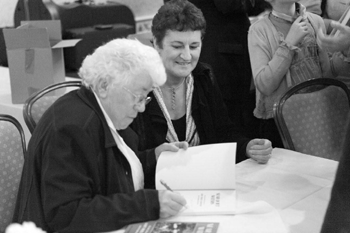 Sr Mary de Lourdes Fahy signing her book
Sr Mary de Lourdes Fahy signing her book
The Gort nuns had no problem with moving on to take on challenges in other places. In 1871, they founded Ennistymon Convent and took charge of the Workhouse Hospital. In 1878, they established a house in Kinvara. At Gort, their school had concentrated on arts and crafts, but at Kinvara it was poultry. In 1961, The Gort nuns founded a house and successful school in Titusville, Florida, where they set up a school of religion.
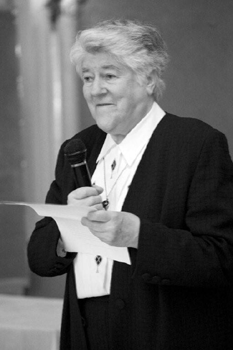 Teresa Delaney rsm, Archivist
Teresa Delaney rsm, Archivist
Many charming photos illustrate the life of the nuns. On pages 110/111, are the letter and envelope sent in 1897 by the War Office, Pall Mall, to Mother Mary Aloysius Doyle announcing Queen Victoria’s intention to bestow on her the Royal Red Cross at Windsor Palace. This was in recognition of her nursing work during the Crimean War. The subject of my favourite photos is the sheer contentment on the faces of the nuns on page 115, namely, Srs. Philomena and Peter (1967) “Experts at the needle” and Srs. Rosarii and Hilda (1967) “Two angelic novices”.
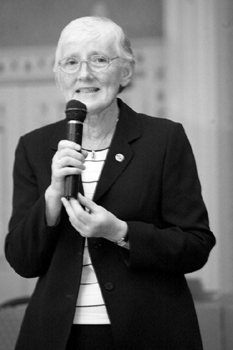 Angela Forde rsm, Provincial Leadership Team
Angela Forde rsm, Provincial Leadership Team
This readable book condenses a well researched history. Local historians will find much to ponder on in the appendices, including Griffiths Valuation for the Parishes of Beagh, Kilmacduagh and Kiltartan, showing who lived where in 1835.
The following is an article printed in the Connaught Tribune – text by John Flatley
Mercy Sisters Celebrate 150 years in Gort
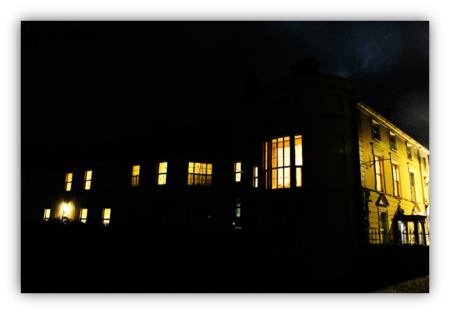
Gort Convent
On November 4th, the people of Gort turned out in large numbers at St. Coleman’s Church, Gort to celebrate with the Sisters of Mercy the 150th anniversary of their coming to the town. Fr. Frankie Lee and Mrs Rosemary Lahiffe conducted the specially assembled choir, Iain Lahiffe played the organ and Emma Lahiffe played the viola. Members of the St. Patrick’s Brass Band gave a Brass accompaniment . A picture of Catherine McAuley, Foundress of the Sisters of Mercy, and of Mother Aloysius Doyle, who led five Sisters of Mercy on their arrival from Carlow to Gort in 1857, were included in the presentation of Gifts. Great grand nieces and grand nephews of Sister Mary Aloysius Doyle were among the Congregation.
A group of past students of the Sisters of Mercy, now students of Gort Community School dressed the Altar.
Bishop Martin Drennan’s Homily
Today’s gospel story about Zaccheus is very well-known. Less well-known is a legend about him. After his meeting with Jesus he left his house early every morning and returned about an hour later. His wife followed him one day to see where he went. She saw him fill a bucket with water, go the sycamine tree from which Jesus had called him, pour the water on the roots of the tree and return home. When he came back to the house she asked him what was the meaning of his ritual. I go back to water the memories, he explained. Wise people go back to water their memories, back to places and people that shaped and in some cases brought lasting changes in their lives. Zaccheus had met the mercy of God in Jesus. That meeting had utterly changed his life and he was determined to keep that priceless experience alive. For all of us called to embody the mercy of God in our lives he has something powerful to say.
What was his experience of mercy ?
- Mercy understands. We see correctly those we see with eyes of compassion. I remember an alcoholic saying, Everyone talks to me about my drinking, nobody talks to me about my thirst. Nobody seemed to have eyes of mercy to understand his deeper need. Zaccheus longed to see Jesus. His search was for inner peace. Jesus understood the deeper need and responded to it. Compassion listens, cares, understands, it is reverence in action.
- Mercy sets free. Last Sunday we heard the story of the Pharisee and a tax collector at prayer. The Pharisee was judgmental and unforgiving. He felt a sense of power, convincing himself that he was much more acceptable to God because of the way he kept the Law. Forgiveness is about letting go, it is about respect, about our common need for mercy. The gospel says that if we find forgiveness impossible it is because we have not really understood the mercy of God in our own lives. Those who have met the generous forgiveness of God can afford to be generous in forgiving one another. Zaccheus met that generous God; he could afford to be generous.
- Mercy enables. Zaccheus wants to live differently, wants to unlive his past, replacing greed and exploitation with generosity, respect, honesty. When the Lord forgives, his way is to lead us to understand the wrong we have done, to grant his pardon for it and give the capacity to live by a different set of values.
- Mercy brings joy and hope. Hope has been described as looking life in the face and finding God in the middle of it. Zaccheus looked life in the face and met God in the midst of it. The outcome was the joy of being at peace, the hope that comes from experiencing God’s saving gifts. He still had to go back to an unpopular job of collecting taxes from unwilling givers, but knowing that God was at his side gave him fresh courage to face the task ahead.

For the past 150 years the Sisters of Mercy here in Gort have been going back to the Lord each day in prayer to water the memories, going back to be filled again and again with the Lord’s gentle mercy, and asking for his strength so that they could be effective in carrying out their mission. The circumstances in which they carried out that mission have changed many a time in those 150 years, but the need for kindness and compassion remains as urgent as ever. In today’s Ireland some have real difficulty with compassion. Now and again after a court case we hear the chilling words, I will never forgive. In an interview Nelson Mandela, soon after his release from prison, expressed the consequence of that attitude, If I can’t forgive then I’m still in prison. Our society needs the mercy that sets free. It needs mercy for other reasons.
In recent weeks there has been much discussion in the media of statistics that showed an increase of violent crime in our society. Violence points to a loss of hope, to a loss of reverence for people. At the root of these difficulties is a loss of reverence for God. I recall a neighbour of mine saying a couple of weeks after Pope John Paul II had visited Ireland in 1979 that his memory of the Pope’s visit was the reverence with which the Pope approached the Eucharist and the reverence which he had for people and he was right in thinking the two were connected. Reverence for Jesus in the Eucharist leads to reverence for Jesus in people, a reverence that gives hope as it gave Zaccheus hope.
For forty years people on this island have been praying for forgiveness, understanding, tolerance, reconciliation, for all that makes for lasting peace. God has responded to their persistent prayer and has given us his gift of peace, a peace that has transformed our country and continues to transform it. The presence of Mr. Paisley in Dublin a few days ago is another sign of that. Now in 2007 Ireland needs another gift. It needs the Lord to transform us with his gift of mercy, the mercy that will flow over into reverence for the things of God, and reverence for all of his people. We need the mercy that brings true joy and fills us with hope. All that Zaccheus received from the Lord at Jericho we now need. If our prayer for that transforming mercy of God is as honest and persistent as our prayer for peace has been, then our prayer will bring about a changed Ireland. As we go from here today we do so with that mission, to draw the mercy of God into our world through prayer, to be ministers of that mercy in our apostolate. For God there is joy in giving his gifts. Zaccheus wanted the mercy of God enough to welcome it in all its dimensions.
If we want it urgently enough the Lord will be generous with us too.
Breege O’Donhoe rsm
Western Province

